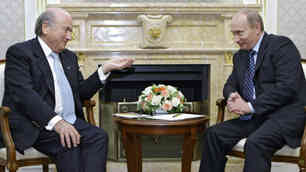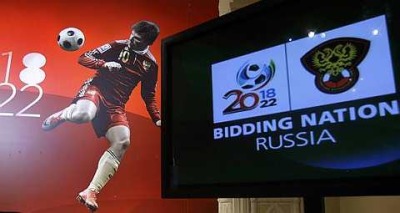By David Owen
November 20 – Russia might have crashed out of the 2010 World Cup last night, but its bid to stage the tournament in 2018 or 2022 appears to be gathering momentum.
In recent weeks, as England have struggled, Russia has emerged as one of the out-and-out favourites to host the 2018 competition.
Its status as a serious challenger was underlined on October 15, when FIFA President Sepp Blatter met Russian Prime Minister Vladimir Putin in Moscow’s White House.
A good time, then, for insideworldfootball to secure an exclusive interview with Alexander Djordjadze, director of planning and operations for the bid.
The first thing to clear up was whether Russian Sports Minister Vitaly Mutko’s imminent replacement as President of the Russian Football Union (RFU) will have a significant impact on the bid.
Djordjadze says not: “He remains the Sports Minister and the Sports Ministry is charged by the Prime Minister with overseeing the bid.
“Also, Mr Mutko is present on the FIFA Executive Committee [the body that will decide in December 2010 where the 2018 and 2022 World Cups will be held].”
Djordjadze also made clear that the bid would get further heavyweight political support from Igor Shuvalov, Putin’s First Deputy Prime Minister, who is to play an important coordinating role with the federal government.
He revealed that Shuvalov had this week convened the first top-level meeting involving Governors of every putative host-city and relevant Ministers.
Unsurprisingly, those present said they would do everything possible to help the bid.
Would Russia’s commitment to stage the 2014 Winter Olympics in Sochi in any way dilute support for the World Cup bid, I wondered.
“Sochi is a sure thing,” Djordjadze replied.
“We have it and of course it is the Number One priority in terms of sports policy.”
 Nevertheless, “Prime Minister Putin (pictured with Blatter) considers the [World Cup] bid a very serious project for Russia,” both as a vehicle for achieving the modernisation of sports and other infrastructure in the country and for developing youth and grass-roots sport.
Nevertheless, “Prime Minister Putin (pictured with Blatter) considers the [World Cup] bid a very serious project for Russia,” both as a vehicle for achieving the modernisation of sports and other infrastructure in the country and for developing youth and grass-roots sport.
“I think a country like Russia can handle both events,” Djordjadze said.
“We are not bidding just to raise the [Russian] flag among distinguished football nations for one year.
“We understand this is a serious thing and that there will be a substantial price tag.”
Though the competition would be confined to the western half of what, even after the break-up of the Soviet Union, remains the world’s largest country, a Russian World Cup would require construction of stadia and other amenities on an epic scale.
As Djordjadze explains it, even Moscow’s 80,000-capacity Luzhniki Stadium, which hosted the 2008 European Cup final, would require “a certain tune-up”.
Elsewhere, four new stadia should be onstream by 2013 or 2014: the handsome Winter Olympic stadium at Sochi; a 62,000-capacity venue with a retractable pitch in Saint Petersburg; a 40,000-seater in Kazan, earmarked for the 2013 Summer World University Games; and another 45-50,000 stadium in Moscow, probably for use by Spartak.
That would leave a further 10 cities in need of new venues.
Djordjadze suggests that, while these would accommodate 40,000 fans at World Cup time, some would probably be reduced in size once the tournament was over.
“We might think of a flexible model of stadium, [with permanent capacity of] 25-30,000 with the potential to be upgraded,” he says.
He adds that there would be “substantial demand” within Russia for the resultant dismantled seating.
He acknowledges that identifying a minimum of 64 locations suitable for use as possible team camps is “a really daunting task”, but not one that is beyond Russia.
“Camps could be anywhere in the country, as long as we suggest viable transportation options,” he says.
The list of Russian host-cities includes a host of evocative names, from Kaliningrad in the west to Yekaterinburg in the east.
Djordjadze pledges that visiting fans would be “most hospitably treated” and would find their trip “very affordable”.
He suggests, moreover, that a Russian World Cup would attract “hundreds of thousands of fans” from places such as the former Soviet Republics who would not otherwise be able to experience one of the world’s great sporting festivals at first hand.
“People will be thrilled to be here,” he says.
Contact the writer of this story at zib.l1745067665labto1745067665ofdlr1745067665owedi1745067665sni@n1745067665ewo.d1745067665ivad1745067665.
Related stories
November 2009: Mutko set to be replaced as head of Russian FA by Abramovich deputy
November 2009: Exclusive – England are behind Russia and Spain warns bid ambassador
November 2009: Exclusive – Russia deserves World Cup more than England, claims Smertin
October 2009: Blatter tells Putin that Russia has a good chance to host 2018 World Cup

